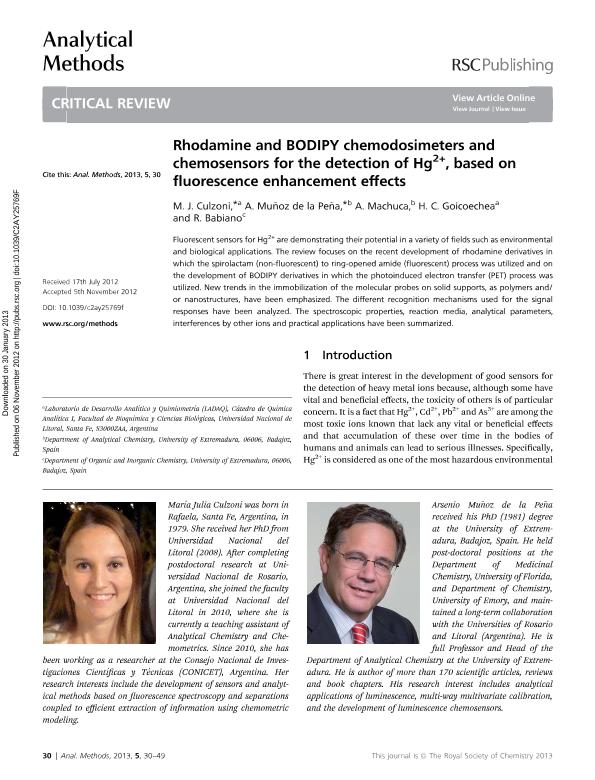Mostrar el registro sencillo del ítem
dc.contributor.author
Culzoni, Maria Julia

dc.contributor.author
la Peña, A. Muñoz de
dc.contributor.author
Machuca, A.
dc.contributor.author
Goicoechea, Hector Casimiro

dc.contributor.author
Babiano, R.
dc.date.available
2017-04-04T18:57:30Z
dc.date.issued
2013-01
dc.identifier.citation
Culzoni, Maria Julia; la Peña, A. Muñoz de; Machuca, A.; Goicoechea, Hector Casimiro; Babiano, R.; Rhodamine and BODIPY chemodosimeters and chemosensors for the detection of Hg2+, based on fluorescence enhancement effects; Royal Society of Chemistry; Analytical Methods; 5; 1; 1-2013; 30-49
dc.identifier.issn
1759-9660
dc.identifier.uri
http://hdl.handle.net/11336/14778
dc.description.abstract
Fluorescent sensors for Hg2+ are demonstrating their potential in a variety of fields as environmental and biological applications. The review focuses on the recent development of rhodamine derivatives in which the spirolactam (non-fluorescent) to ring-opened amide (fluorescent) process was utilized and on the development of BODIPY derivatives in which the photoinduced electron transfer (PET) process was utilized. New trends on the immobilization of the molecular probes on solid supports, as polymers and/or nanostructures, have been emphasized. The different recognition mechanisms used for the signal responses have been analyzed. The spectroscopic properties, reaction media, analytical parameters, interferences by other ions and practical applications have been summarized.
dc.format
application/pdf
dc.language.iso
eng
dc.publisher
Royal Society of Chemistry

dc.rights
info:eu-repo/semantics/openAccess
dc.rights.uri
https://creativecommons.org/licenses/by-nc-sa/2.5/ar/
dc.subject
Bodipy
dc.subject
Sensor
dc.subject
Chemosensor
dc.subject
Chemodosimeter
dc.subject.classification
Química Analítica

dc.subject.classification
Ciencias Químicas

dc.subject.classification
CIENCIAS NATURALES Y EXACTAS

dc.title
Rhodamine and BODIPY chemodosimeters and chemosensors for the detection of Hg2+, based on fluorescence enhancement effects
dc.type
info:eu-repo/semantics/article
dc.type
info:ar-repo/semantics/artículo
dc.type
info:eu-repo/semantics/publishedVersion
dc.date.updated
2017-03-22T15:19:20Z
dc.journal.volume
5
dc.journal.number
1
dc.journal.pagination
30-49
dc.journal.pais
Reino Unido

dc.description.fil
Fil: Culzoni, Maria Julia. Universidad Nacional del Litoral. Facultad de Bioquímica y Ciencias Biológicas; Argentina
dc.description.fil
Fil: la Peña, A. Muñoz de. Universidad de Extremadura. Departamento de Química analítica; España
dc.description.fil
Fil: Machuca, A.. Universidad de Extremadura. Departamento de Química analítica; España
dc.description.fil
Fil: Goicoechea, Hector Casimiro. Consejo Nacional de Investigaciones Científicas y Técnicas; Argentina. Universidad Nacional del Litoral. Facultad de Bioquímica y Ciencias Biológicas; Argentina
dc.description.fil
Fil: Babiano, R.. Universidad de Extremadura. Departamento de Químca Orgánica e Inorgánica; España
dc.journal.title
Analytical Methods
dc.relation.alternativeid
info:eu-repo/semantics/altIdentifier/doi/http://dx.doi.org/10.1039/c2ay25769f
dc.relation.alternativeid
info:eu-repo/semantics/altIdentifier/url/http://pubs.rsc.org/en/Content/ArticleLanding/2013/AY/C2AY25769F#!divAbstract
Archivos asociados
